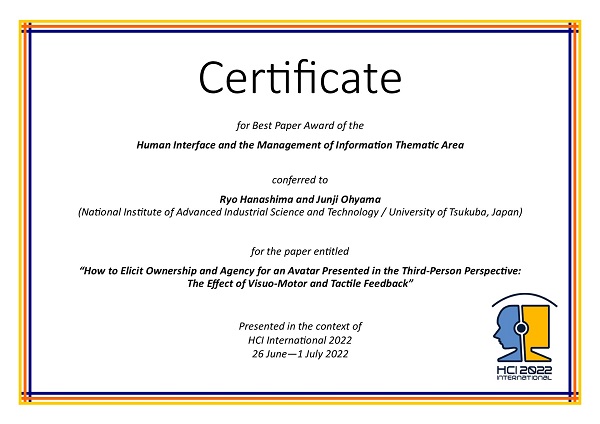
Certificate for Best Paper Award of the Human Interface and the Management of Information Thematic Area
The award has been conferred to
Ryo Hanashima and Junji Ohyama
(National Institute of Advanced Industrial Science and Technology / University of Tsukuba, Japan)

Ryo Hanashima
(presenter)
for the paper entitled
"How to Elicit Ownership and Agency for an Avatar Presented in the Third-Person Perspective: The Effect of Visuo-Motor and Tactile Feedback"
Presented in the context of
HCI International 2022
26 June—1 July 2022
Paper Abstract
"The realism of experience of using a virtual body in virtual reality (VR) is associated with ownership (one’s self-attribution of a body) has been shown. However, whether or not ownership can be elicited for a virtual body presented by the third-person perspective is under debate. This study investigated the effect of multimodal presentations on the ownership of a male virtual body presented in the third-person perspective in three conditions (Visuo-tactile, visuo-motor, visuo-motor-tactile condition) (N = 40). We compared the illusory effect of ownership in the three conditions in male and female participants using a questionnaire and a 2 × 3 mixed-design ANOVA. Our study revealed that the male participants in the visuo-motor-tactile condition affirmed moderate (+1) of ownership, but the female participants did not. Ownership was significantly higher in the visuo-tactile (p < .01) and visuo-motor (p < .05) conditions. The results suggest that both visuo-motor synchrony and visuo-tactile feedback are essential factors to induce ownership to the virtual body in a third-person perspective. Moreover, our data suggest that matching the participant’s gender identity and the appearance of an avatar’s gender might be important for elicited ownership. Additionally, we evaluated the agency on the virtual body in the third-person perspective in the same three feedback conditions and found that only visuo-motor feedback is essential to elicit agency, unlike the causal factors of the ownership."
The full paper is available through SpringerLink, provided that you have proper access rights.